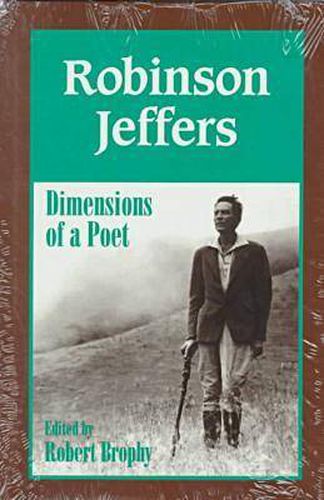Readings Newsletter
Become a Readings Member to make your shopping experience even easier.
Sign in or sign up for free!
You’re not far away from qualifying for FREE standard shipping within Australia
You’ve qualified for FREE standard shipping within Australia
The cart is loading…






This title is printed to order. This book may have been self-published. If so, we cannot guarantee the quality of the content. In the main most books will have gone through the editing process however some may not. We therefore suggest that you be aware of this before ordering this book. If in doubt check either the author or publisher’s details as we are unable to accept any returns unless they are faulty. Please contact us if you have any questions.
American Poet Robinson Jeffers (1887-1962) was educated in the classics from an early age and published his first book of poetry in 1912. Most of Jeffers’ work is distinguished by strong elemental narratives set in the California Carmel/Big Sur area. His imagery often puts the rugged beauty of the landscape in opposition to the degraded and introverted condition of modern humanity. Jeffers’ themes draw on classical and biblical sources from his early education, and his strong interest in Nietzsche’s concept of individualism. Many of his contemporaries erroneously regarded him as a nihilist.
This collection of essays attempts to illustrate the art and complexity of Jeffers, while presenting new insights into his work and its perception among his contemporaries. The essayists are Robert Brophy, Alex Vardamis, Robert Zaller, Terry Beers, Tim Hunt, David J. Rothman, Alan Soldofsky, Kirk Glaser, and William Everson. The essays represent a range of critical points of entry-some are on the cutting-edge of criticism and break new ground, others attempt to place Jeffers in the established perspectives of Western civilization’s Christian humanism and American poetry’s landscape-centered mysticism. The collection constitutes some of the most conversant and active research in the field of Jeffers studies. The critiques speak to the nature of Jeffer’s poetry- how it challenged both the minds and hearts of its readers and prompted them to carefully define their own values and authentically find their own center.
$9.00 standard shipping within Australia
FREE standard shipping within Australia for orders over $100.00
Express & International shipping calculated at checkout
This title is printed to order. This book may have been self-published. If so, we cannot guarantee the quality of the content. In the main most books will have gone through the editing process however some may not. We therefore suggest that you be aware of this before ordering this book. If in doubt check either the author or publisher’s details as we are unable to accept any returns unless they are faulty. Please contact us if you have any questions.
American Poet Robinson Jeffers (1887-1962) was educated in the classics from an early age and published his first book of poetry in 1912. Most of Jeffers’ work is distinguished by strong elemental narratives set in the California Carmel/Big Sur area. His imagery often puts the rugged beauty of the landscape in opposition to the degraded and introverted condition of modern humanity. Jeffers’ themes draw on classical and biblical sources from his early education, and his strong interest in Nietzsche’s concept of individualism. Many of his contemporaries erroneously regarded him as a nihilist.
This collection of essays attempts to illustrate the art and complexity of Jeffers, while presenting new insights into his work and its perception among his contemporaries. The essayists are Robert Brophy, Alex Vardamis, Robert Zaller, Terry Beers, Tim Hunt, David J. Rothman, Alan Soldofsky, Kirk Glaser, and William Everson. The essays represent a range of critical points of entry-some are on the cutting-edge of criticism and break new ground, others attempt to place Jeffers in the established perspectives of Western civilization’s Christian humanism and American poetry’s landscape-centered mysticism. The collection constitutes some of the most conversant and active research in the field of Jeffers studies. The critiques speak to the nature of Jeffer’s poetry- how it challenged both the minds and hearts of its readers and prompted them to carefully define their own values and authentically find their own center.